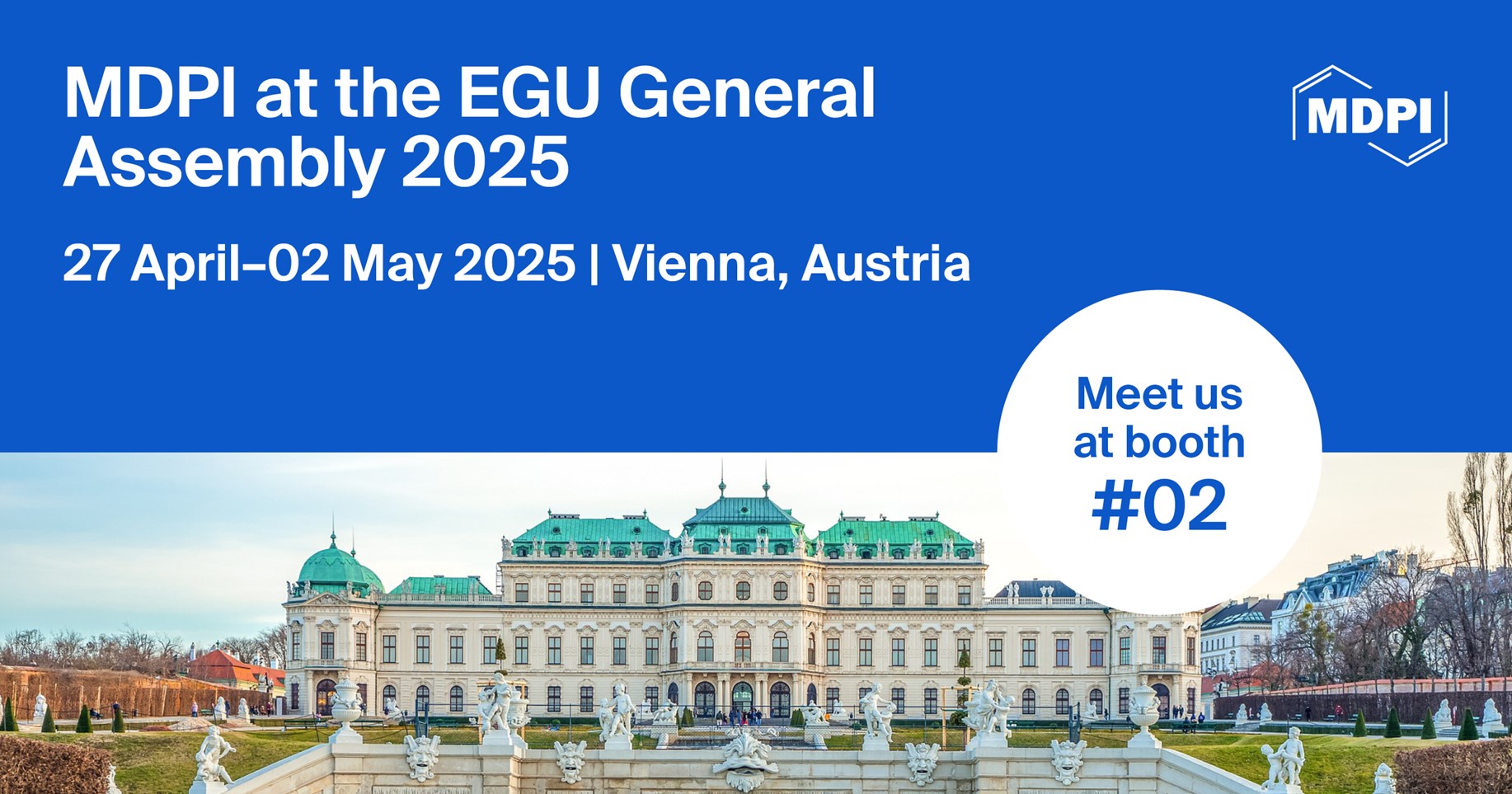
Meet Us at the EGU General Assembly 2025, 27 April–2 May 2025, Vienna, Austria
MDPI will be attending the General Assembly 2025 of the European Geosciences Union (EGU), which will be held in Vienna, Austria, and online, from 27 April to 2 May 2025 at booth #2 in the Entrance Hall. The EGU General Assembly 2025 brings together geoscientists from all over the world to one meeting, covering all disciplines of Earth, planetary, and space science. The EGU aims to provide a forum where scientists, especially early career researchers, can present their work and discuss their ideas with experts in all fields of geoscience.
The following MDPI journals will be represented:
| ● Remote Sensing; | ● Water; | ● Geosciences; |
| ● Hydrology; | ● Aerobiology; | ● Applied Sciences; |
| ● Atmosphere; | ● Climate; | ● Coasts; |
| ● Earth; | ● Energies; | ● Environments; |
| ● Fire; | ● Forests; | ● Gases; |
| ● GeoHazards; | ● Geomatics; | ● Geotechnics; |
| ● Glacies; | ● ISPRS International Journal of Geo-Information (IJGI); | ● Journal of Marine Science and Engineering (JMSE); |
| ● Land; | ● Limnological Review; | ● Meteorology; |
| ● Minerals; | ● Nitrogen; | ● Quaternary; |
| ● Resources; | ● Soil Systems; | ● Sustainability. |
If you are attending the conference, please visit our booth. Our delegates look forward to meeting you in person and answering any questions that you may have. For more information about the conference, please visit the following website: https://www.egu25.eu/.
Session Recommendation
We invite you to follow the sessions organized by MDPI journal scholars:
1. Drivers affecting global carbon sink of terrestrial ecosystems
Convener: Pekka Kauppi | Co-convener: Sean Sloan
2. Observational strategies and sensing techniques for marginal, poorly covered and degraded urban areas
Convener: Francesco Soldovieri | Co-conveners: Maurizio Mazzoleni, Fabio Tosti, Andrea Scozzari
3. Non-Destructive Testing and Earth Observation Methods for Sustainability and Resilience of Infrastructure and Built Environments
Convener: Andrea Benedetto | Co-conveners: Imad Al-Qadi, Andreas Loizos, Francesco Soldovieri, Fabio Tosti
Booth Event: Award Ceremony
MDPI will hold two award ceremonies during the EGU. You are welcome to visit booth #2 at the entrance hall and congratulate the outstanding winners on us.

Remote Sensing Travel Award
Winner: Dr. Nicola Nocentini
Award Presenter: Prof. Dr. Fabio Tosti (Associate Editor of Remote Sensing)
Dr. Nicola Nocentini is a researcher specializing in the spatiotemporal prediction of rainfall-induced landslides using dynamic machine learning approaches. He currently conducts research at both the University of Padua and the University of Florence, focusing on the improvement of landslide forecasting models for regional-scale early warning systems.
He earned his Ph.D. in Earth Sciences from the University of Pisa, and he has collaborated with different institutions, including the Norwegian Geotechnical Institute (NGI) in Oslo, where he contributed to the calibration of machine learning algorithms for landslide prediction. He has also been actively involved in projects with the Italian National Civil Protection Department, enhancing rainfall threshold models and web-based monitoring platforms.
Dr. Nocentini has authored multiple peer-reviewed publications and presented his research at leading international conferences such as the EGU General Assembly and the World Landslide Forum. His expertise spans GIS-based modeling, statistical analysis, and AI-driven geohazard prediction, making significant contributions to the field of landslide risk assessment and mitigation.

Geosciences Best Paper Award
Winning Paper: “Improving the Estimation of the Occurrence Time of an Impending Major Earthquake Using the Entropy Change of Seismicity in Natural Time Analysis”
by Panayiotis A. Varotsos, Nicholas V. Sarlis, Efthimios S. Skordas, Toshiyasu Nagao, Masashi Kamogawa, E. Leticia Flores-Márquez, Alejandro Ramírez-Rojas and Jennifer Perez-Oregon
Geosciences 2023, 13(8), 222; https://doi.org/10.3390/geosciences13080222
Award Presenter: Prof. Dr. Olivier Lacombe (Section Editor-in-Chief of Geosciences)
Prof. Dr. Panayiotis A. Varotsos is Emeritus Professor at the National and Kapodistrian University of Athens. Since the 1970s, he has focused on the dielectric properties of solids, including several rocks, and has established a rigorous foundation of the thermodynamic parameters that govern the formation and/or migration of defects in solids. In the beginning of the 1980s, Prof. Dr. Varotsos found that the presence of aliovalent impurities in ionic solids results in the formation of extrinsic defects, forming electric dipoles, the relaxation time of which depends on pressure (stress). He also showed that when the pressure reaches a critical value, σcr, a cooperative orientation of these dipoles may occur, which results in the emission of a transient electric signal. This may happen before an earthquake (critical point) since the stress gradually increases in the focal region before the rupture. These signals are termed Seismic Electric Signals (SESs) and have been experimentally detected since 1981, providing information on the magnitude and location of the epicenter of a forthcoming earthquake. Such signals have been observed at many occasions in Greece and in other countries. Moreover, in 2001, a new concept of time, termed natural time, was introduced, the analysis of which enables the study of the dynamical evolution of a complex system and identifies when the system approaches a dynamic phase transition. Such a transition is a major earthquake occurrence.
Prof. Dr. Varotsos has authored or co-authored approximately 300 publications and five monographs.
